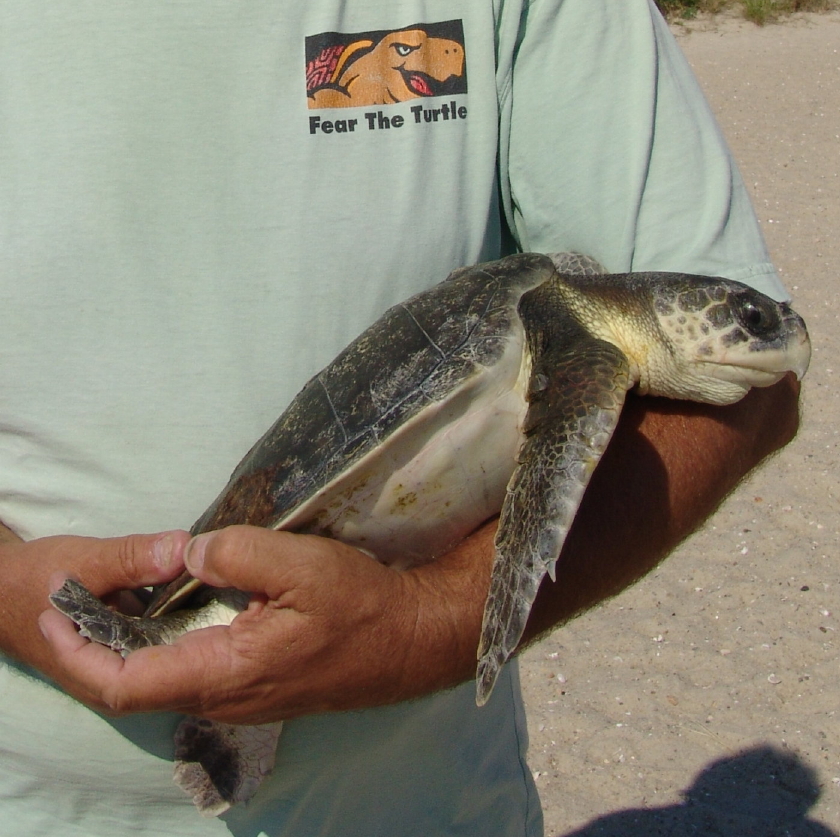The Cape Cod Times, “Kemp’s Ridley Turtle Found Stranded,” reports this morning, “The first cold-stunned Kemp’s ridley [sea] turtle of the stranding season was rescued in local waters yesterday [October 23rd], according to the Massachusetts Audubon Wellfleet Bay Wildlife Sanctuary.” Bob Prescott, director of the sanctuary, noted that the turtle weighed about 8 pounds and was estimated at around four years old. It had an old boat propellor injury on its left front flipper that may have weakened the turtle and predisposed this animal to early cold-stunned stranding.
Cold-Stunned Kemp’s Ridley Sea Turtle (File Photograph)
Cold-stunned strandings of endangered sea turtles occur each fall in Cape Cod Bay. These juvenile reptiles, usually two to five years old, become trapped by walls of cold ocean water within the warmer hook of Cape Cod during normal southward migration as temperatures drop early each fall. When bay water plunges to around 50F, these turtles become cold-stunned, enter a stupor-like state and are tossed on the beach by sustained winds.
The earliest standed turtles, usually found in late October or early November, have the smallest mass, weighing in at five pounds or less. As the season progresses, larger and larger animals succumb to cold-stunning and are tossed by autumn storms onto the beach. Species include Kemp’s ridleys, green sea turtles and loggerheads, which are the more massive and usually the last ones to strand. Occasionally, a hybrid or a hawksbill has been known to strand on Cape Cod beaches. All strandings, with only an exception or two to prove the rule, occur on bayside beaches from Provincetown to Sandwich, with the greatest numbers found between Truro and Dennis.
Yesterday afternoon’s turtle was discoverd by beach walkers on Sandy Neck beach in Barnstable, brought to the Wellfleet Bay Wildlife Sanctuary for stabilization, and then transported to New England Aquarium for medical treatment and rehabilitation.
Two-Year-Old Kemp’s Ridley Sea Turtle Rescued from Chapin Beach, Dennis
You may recall that the Turtle Journal team rescued a small, pre-stunned Kemp’s Ridley at nearby Chapin Beach in Dennis on September 5th (see Saving a Critically Endangered Sea Turtle).
What to Do if You Find a Sea Turtle
Sea turtles are federally protected and cannot be legally handled without an appropriate license. If you see a sea turtle in distress on the beach, NEVER return it to the water. Move it above the high water mark, cover it with dry seaweed to prevent additional hypothermia, mark the spot with some gaudy flotsam and call Wellfleet Bay Wildlife Sanctuary at 508-349-2615 as soon as possible. If your call comes “after hours,” you may leave a message on the sanctuary line or you can call the 24/7 turtle hot line at 508-274-5108 any time of the day or night. The Turtle Journal team will answer your call and respond immediately to rescue the animal.
Tags: Barnstable, boat propellor injury, Bob Prescott, Cape Cod, Cape Cod Bay, Cape Cod beaches, Cape Cod Times, Chapin Beach, cold-stunned, Dennis, endangered sea turtles, federally protected, First cold-stunned sea turtle, flotsam, green sea turtles, Hawksbill, hybrid sea turtle, hypothermia, juvenile reptiles, Kemp's ridley sea turtle, Kemp's Ridley Turtle Found Stranded", loggerheads, Massachusetts Audubon Wellfleet Bay Wildlife Sanctuary, medical treatment, migration, New England Aquarium, ocean, Provincetown, rehabilitation, rescue, Sandwich, Sandy Neck beach, stranding season, Truro, turtle, turtle hot line, Turtle Journal team, Wellfleet Bay Wildlife Sanctuary


[…] If you’re looking for a nice spot to begin your journey, we suggest “Shark Attack” from December 3rd, 2000 as an interesting nexus between the shark posting from this last weekend, “Yikes! 11-Foot Blue Shark in Wellfleet Bay,” and the beginning of the sea turtle cold-stunning season, “First Cold-Stunned Sea Turtle of 2008 Rescued.” […]
[…] There’s always something extraordinary happening around the corner. First-ever restoration of an oyster reef ecosystem on Cape Cod, conservation of  a rapidly disappearing native heathland, research to save the ancient and noble horseshoe crab, satellite tracking of osprey journeys, study of sudden salt-marsh die-off on the Outer Cape, educating the next generation of young naturalists, and this month, rescuing the world’s most endangered sea turtles from certain hyptothermic death on Cape Cod beaches (see First Cold-Stunned Sea Turtle of 2008 Rescued). […]